For 2017 I made a goal to read 100 books and I was able to surpass that goal by reading 102! I also read 29 cookbooks. Here are my top 10 books of 2017 and my top 5 cookbooks:
Fiction
Good Morning, Midnight by Lily Brooks-Dalton
The Sunshine Sisters by Jane Green
Small Great Things by Jodi Picoult
The Second Mrs. Hockday by Susan Rivers
The Stars are Fire by Anita Shreve
Non-fiction
Everyday Sexism by Laura Bates
The Stranger in the Woods by Michael Finkel
In Memory of Bread by Paul Graham
The Unsettlers by Mark Sundeen
Hungry Heart by Jennifer Weiner
Cookbooks
Dishing Up the Dirt by Andrea Bemis
The Farmhouse Chef by Jamie Dement
Adventures in Slow Cooking by Sarah DiGregorio
The Forest Feast by Erin Gleeson
Real Food Heals by Seamus Mullen
Wednesday, January 3, 2018
Tuesday, January 2, 2018
December 2017 Cookbooks
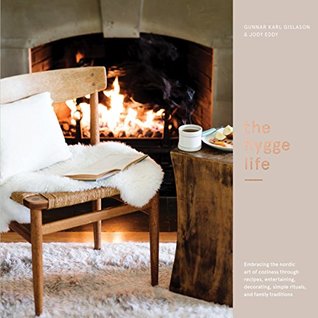
The Hygge Life by Gunnar Karl Gislason and Jody Eddy
I didn't realize when I put this book on hold that it was a cookbook. The author gives a brief overview of the Scandinavian concept of hygge - loosely translated to "coziness." Then the book is divided into a few categories - Starting the Day, Caring for Yourself, Staying In, Easy Gatherings and Holidays, and Getting Out. All of these chapters give an overview of how you can add hygge to each of these areas and then have a collection of recipes. I liked how the book was laid out and there were a lot of recipes and ideas in each chapter. There weren't a lot of recipes I want to try, but I still think it's a unique hygge cookbook.
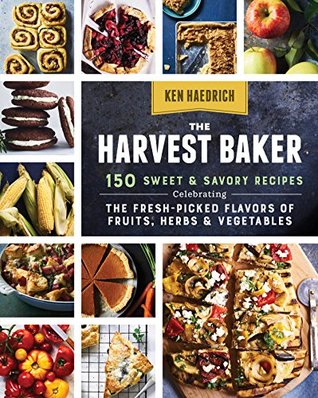
The Harvest Baker by Ken Haedrich
The Harvest Baker focuses on all aspects of baking - not just sweets. Ken Haedrich covers everything from bread, pizza, tarts, pies, and more both savory and sweet and all with a focus on freshly harvested produce. The cookbook is divided into four parts - For the Love of Bread, Crusty Entrees, The Baker's Sweet Tooth, and Top It Off and then each section is further divided into chapters with more specific category recipes. If you enjoy baking or what to try your hand at baking this is the cookbook for you. Haedrich gives a lot of information at the beginning about ingredients and baking tools that is very helpful for the beginner or someone wanting to take their baking to the next level.
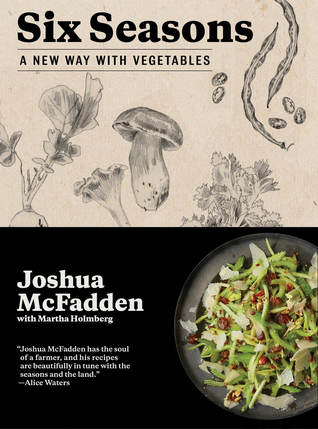
Six Seasons by Joshua McFadden
Many seasonal cookbooks divide the year into 4 seasons - spring, summer, fall, and winter. But in Six Seasons Joshua McFadden divides the year into 6 - spring, early summer, mid-summer, late summer, fall, and winter and I think this really works especially if you garden. There is a big difference in what is coming out of the garden in early summer versus late summer. Each season has 3-5 recipes featuring an ingredient that is available during that season. This is a great way to focus on seasonal eating/cooking and make the most of whatever produce is available and at peak freshness. Definitely a few recipes I want to try in here!

Bobby Flay Fit by Bobby Flay
Obviously you can look at Bobby Flay and see he's doing something right - he's in his fifties in a very high pressure field and looks great. He explains how he changed his eating and exercise habits when he turned 40 and realized he wasn't as healthy as he wanted to be and needed to be for his career. The first chapter is called Healthy Basics and covers making basic dressings, sauces, condiments, and basic healthy cooking techniques, then the rest of the book is divided into your basic cookbook chapters - breakfast, snacks, lunch, etc. There weren't that many recipes I wanted to try, but it's definitely worth checking out if you want to focus more on whole food cooking.
December 2017 Reviews
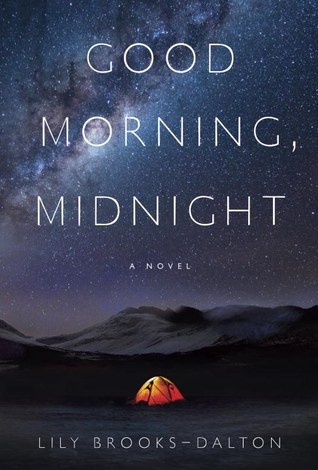
Good Morning, Midnight by Lily Brooks-Dalton
At the same time Mission Specialist Sullivan is on the spaceship Aether on a return flight from Jupiter when all their communication with Earth goes silent. No one on board can figure out what could have happened to make all communications around the world cease. As Sully and the other crew members work toward coming back to Earth she too remembers and contemplates her life before and how much she struggled to connect with other people.
While both Augustine and Sully are loners by nature, they still long for connection especially now that it's obvious something really terrible has happened on Earth. Brooks-Dalton does a great job connected these two seemingly-unrelated stories and the ending is definitely a shocker - I truly did NOT see that coming AT ALL. Definitely a unique and beautifully written book that explores the issues of loneliness, belonging, and love.
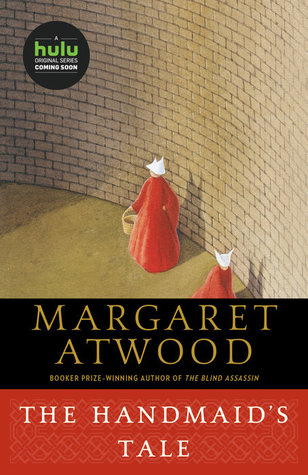
The Handmaid's Tale by Margaret Atwood (Books & Banter book club)
Somehow I managed to get through college as an English major and Women's Studies minor without reading The Handmaid's Tale. Based on our current political climate I felt like it would be a good time to read it (and my book club voted it in). I wasn't sure what to expect, but I didn't love it. It was VERY slow to get into, and once the storyline did pick up it felt incomplete - maybe that was on purpose? I do think the author did a good job of showing how quickly and completely a society could change from freedom to a totalitarian regime. There were quite a few things that I could very much relate to current events even though this was written in the mid-1980's. I wish there had been 2 or 3 more chapters to show what happened to Offred at the end. I also wish there had more more to her backstory - what happened to her daughter? What was her real name? It was probably on purpose to reinforce the totalitarian feel of the story, but there was too much missing information. I'll be curious to see what my book club thinks too.
Some quotes I liked:
"There is more than one kind of freedom, said Aunt Lydia. Freedom to and freedom from. In the days of anarchy, it was freedom to. Now you are being given freedom from. Don't underrate it." (p. 24)
"I intend to get out of here. It can't last forever. Others have thought such things, in bad times before this, and they were always right, they did get out one way or another, and it didn't last forever. Although for them it may have lasted all the forever they had." (p. 134)
"Better never means better for everyone, he says. It always means worse, for some." (p. 211)
Some quotes I liked:
"There is more than one kind of freedom, said Aunt Lydia. Freedom to and freedom from. In the days of anarchy, it was freedom to. Now you are being given freedom from. Don't underrate it." (p. 24)
"I intend to get out of here. It can't last forever. Others have thought such things, in bad times before this, and they were always right, they did get out one way or another, and it didn't last forever. Although for them it may have lasted all the forever they had." (p. 134)
"Better never means better for everyone, he says. It always means worse, for some." (p. 211)

Lagom: the Swedish Art of Balanced Living by Linnea Dunne
In the vein of all the Swedish/hygge books that are currently so popular, Lagom explores the Swedish idea of "not too little, not too much, but just enough" in all aspects of life. The book is divided into chapters like Living Lagom - work-life balance, Feeling Lagom - health & wellbeing. Overall, I liked how the book was laid out and there were a lot of cute illustrations and photos, but the overall book just seemed lacking. I've read a few hygge books and they seem MUCH more informative and clear in the direction/purpose of the book. There were also a few pages where there was black text on a navy blue background and it was very hard to see the text in those sections. Overall, it was OK, but I'll stick with the hygge books for now.

Anne of Green Gables by L.M. Montgomery (Evening Edition book club)
This was my absolutely FAVORITE book series when I was a kid. My grandmother gave me all the books and I even got my husband to read this one before we went to Prince Edward Island for our honeymoon. But, I was concerned about re-reading it and not liking it as much as an adult. Thankfully, that wasn't the case. After I finished it my first thought was, "Now I want to re-read the rest of the series!"
Anne is an orphan girl who is mistakenly given to brother and sister Matthew and Marilla Cuthbert when they wanted to adopt a young man to help on their farm. Matthew is charmed by talkative Anne and convinces Marilla to keep her. Anne has a way of always getting into "scrapes" and trouble always finds her, but soon Matthew and Marilla have fallen in love with Anne and can't imagine Green Gables without her. The reader follows Anne as she goes from a VERY talkative child to a young woman by the end of the book. I will admit the younger Anne kind of got on my nerves a little with all her talking, but Montgomery does a great job in showing Anne grow up, but still keeping her personality and imagination intact. Overall, a very uplifting and fun book with a wonderful main character.
Some quotes I really liked:
"'Why must people kneel down to pray? If I really wanted to pray I'll tell you what I'd do. I'd go out into a great field all alone or into the deep, deep woods, and I'd look up into the sky - up - up - up - into that lovely blue sky that looks as if there was no end to its blueness. And then I'd just feel a prayer.'" (p. 52)
"'I'm so glad I live in a world where there are Octobers. It would be terrible if we just skipped from September to November, wouldn't it?'" (p. 118)
Anne is an orphan girl who is mistakenly given to brother and sister Matthew and Marilla Cuthbert when they wanted to adopt a young man to help on their farm. Matthew is charmed by talkative Anne and convinces Marilla to keep her. Anne has a way of always getting into "scrapes" and trouble always finds her, but soon Matthew and Marilla have fallen in love with Anne and can't imagine Green Gables without her. The reader follows Anne as she goes from a VERY talkative child to a young woman by the end of the book. I will admit the younger Anne kind of got on my nerves a little with all her talking, but Montgomery does a great job in showing Anne grow up, but still keeping her personality and imagination intact. Overall, a very uplifting and fun book with a wonderful main character.
Some quotes I really liked:
"'Why must people kneel down to pray? If I really wanted to pray I'll tell you what I'd do. I'd go out into a great field all alone or into the deep, deep woods, and I'd look up into the sky - up - up - up - into that lovely blue sky that looks as if there was no end to its blueness. And then I'd just feel a prayer.'" (p. 52)
"'I'm so glad I live in a world where there are Octobers. It would be terrible if we just skipped from September to November, wouldn't it?'" (p. 118)

Remodelista: the Organized Home by Julie Carlson
I wasn't familiar with the Remodelista website before happening upon this book, but now after reading this one I'll be checking out the website. In this book the focus is all on organization. I really like how it's laid out with "the art of order: a manifesto" with 8 overall organizing guidelines, 12 universal storage tactics, and how daily rituals can help keep you organized. Then there are chapters for each major area of your home - kitchen, bathroom, closet, etc. and at the end are resources to find some of the items shown in the book. It is really a beautiful book that doesn't necessarily encourage minimalism, but shows how to best make use of whatever space you have and highlight special items. This is one I could probably buy and refer back to forever!

Finding God in the Waves: how I lost my faith and found it again through science by Mike McHargue
While I don't personally agree with all Mike's current views on God and the Bible, I do appreciate the rawness and honesty of this book. He really lays out his struggle with his faith and how much he suffered trying to work things out in his mind. Definitely a unique book about one man's faith being lost and found.
Some quotes I liked:
"If you're a Christian who wonders what to do with someone who's in doubt, consider these words carefully: Love and grace speak loudly. The first and best response to someone who's faith is unraveling is a hug. Apologetics aren't helpful. Neither are Scripture references. The first thing a hurting person needs is to know they're not alone. My path back to God was paved with grace by those who received my doubt in love." (p. 119)
"But I've learned that the need for certainty is an addiction we can kick - that it's possible to have faith, and even follow Christ, without needing to defend historical Christianity like a doctoral thesis. We can approach beliefs not as gems to be mined from the earth and protected with clenched fists, but as butterflies that land on an open hand - as gifts to enjoy but not possess." (p. 141)
"Instead of fighting science or trying to filter science through my understanding of God, I discovered that you can begin by accepting scientific evidence - and therefore, scientific accounts of how our universe came to be - and still see the face of God." (p. 149)
"Saying 'religion is bad' is a lot like saying 'eating is bad.' Eating can be bad, but it depends on what you eat or how much you eat. Religion can be bad, but it depends on how you view God and how attached your faith is to an authoritarian system...When atheists criticize oppressive religious systems, I stand with them. But to paint all faith with the same brush is to oversimplify the matter, and this view ignores the insights of neuroscientists and anthropologists who find merit in healthy spiritual expression." (p. 159-60)
"One thing I found particularly striking was that when people experienced a prayer going unanswered, or being answered via a redemptive perspective on suffering, the way they prayed changed. Prayer became less about asking God for something and more about being in God's presence." (p. 172)
"Trauma leaves an impression on your brain. And when you recall traumatic events from your past, or when you experience things that remind you of them, your amygdala re-creates the fear and pain you had in those moments. Leaving my church was traumatic, and that trauma was amplified by my childhood experiences of rejection...My fierce independence, my willingness to walk away from the crowd, was merely a coping strategy I'd developed in response to being bullied. The way I played it, no one could reject me if I didn't need them in the first place. I'd bet a lot of you know exactly what I'm talking about." (p. 216)
"Science gives us fact. Faith gives us meaning. These two lenses, so often set up in opposition to each other, are most powerful when used together...We don't have to choose one or the other...But if we open ourselves up to receive both, we'll be surprised by what we find. And God will meet us there." (p. 246-7)
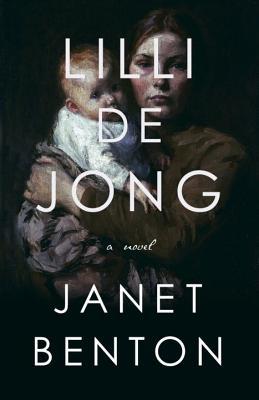
Lilli de Jong by Janet Benton
When Lilli de Jong finds herself pregnant out of wedlock and thrown out of her Quaker job and home in 1883 Philadelphia she ends up in an institution for unwed mothers. The charity seeks to help unwed mothers escape the stigma by allowing them to give birth and adopt the babies out so the women can get on with their lives as if the pregnancy never happened. But, Lilli truly believed Johan was going to send for her and that they would be married. When she can't get in touch with him, she finally believes he lied just to get her to have sex with him. But, once she has her daughter she can't bear to give her away. Despite being warned about how hard it will be for her and her daughter, Lilli is determined to survive somehow. And she does, but barely. The few short months after Charlotte's birth are horrible in almost every way imaginable - Lilli stoops to things she would have NEVER considered previously. Her story ends better than most in her circumstances, but it very much highlights how hard it is for women in almost any time. What's most disturbing is that things weren't all that much different for unwed mothers even up until the 1960's or 70's - women then did have more options that Lilli did, but it's very hard to dig out of the hole alone. Definitely a compelling book that highlights the bond between mother and child and the struggles women have faced since the beginning of time.
Subscribe to:
Comments (Atom)